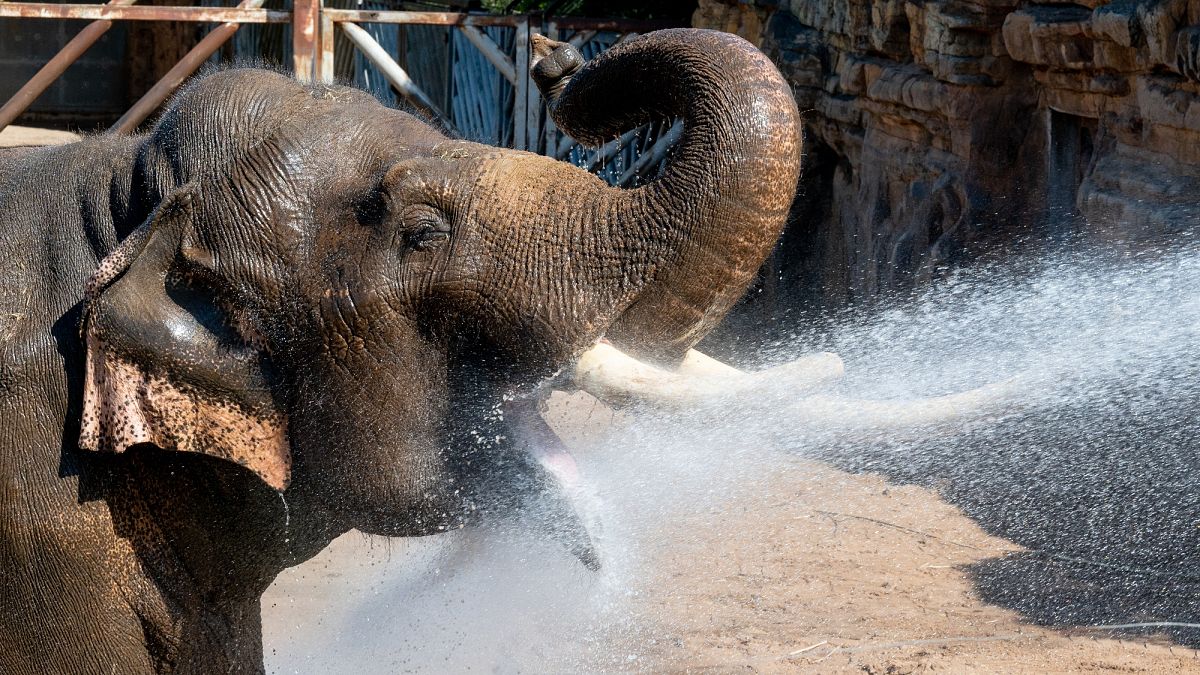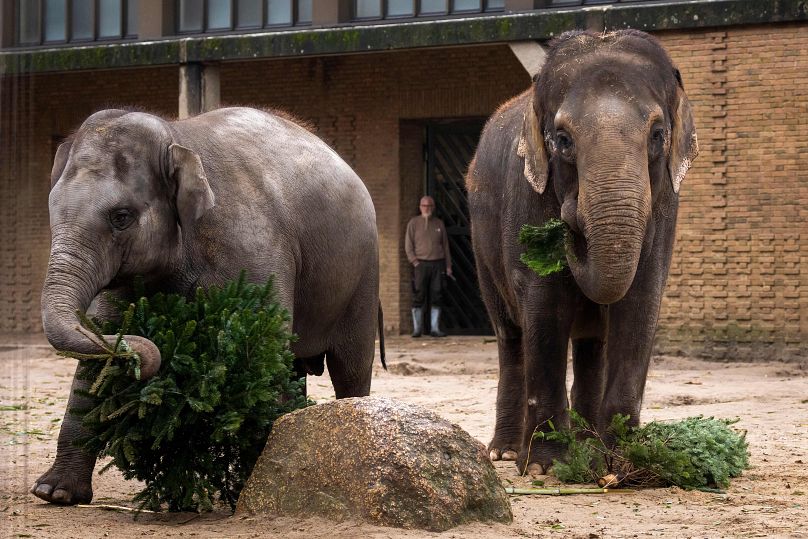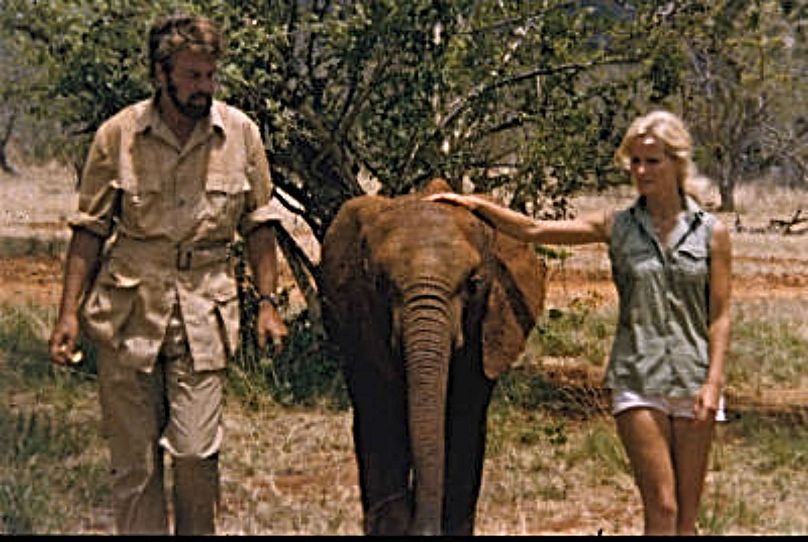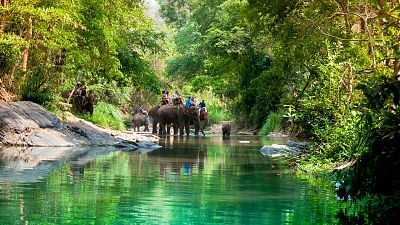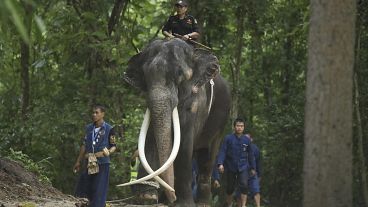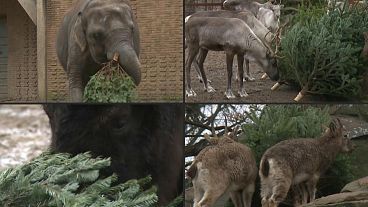Born Free is calling on the government and UK zoos to release elephants back to their natural habitats. But other experts disagree.
Elephants in British zoos have a worse quality of life and significantly lower life expectancy than their counterparts in the wild, an international wildlife charity has said.
Born Free is calling on the public to sign a petition for an ‘elephant-free UK’, 40 years after the charity was founded.
Co-Founders Dame Virginia McKenna, the late Bill Travers and their son Will Travers have been striving for the last four decades to bring attention to elephants kept in captivity.
They have found that 40 per cent of infant elephants in zoos die before the age of five and that captive-born elephants in the UK have an average lifespan of just 20 years, compared with a lifespan of 50 years in the wild.
The inspiration for the Born Free charity was Pole Pole, an elephant who McKenna and Travers - both actors - had met during the making of 1969 film An Elephant Called Slowly.
Pole Pole was later taken from the wild by the Kenyan government as a gift for London Zoo. By 1983, she was dead and only a teenager; elephants can live up to 70 years in the right environment.
She was also left to live alone in London Zoo - and that’s a practice not recommended for elephants who thrive when living in groups.
Even today, though, it’s estimated that of the 49 elephants currently living in British zoos, at least two are housed on their own.
Which European countries have the most elephants?
Across Europe, it’s estimated that 580 of the herd animals are kept in zoos. Born Free say many of these elephants “develop and display abnormal stereotypic behaviours, such as compulsive rocking and swaying, as a consequence of long-term psychological damage”.
The Born Free plan is proving to be controversial.
Both the British and Irish Association of Zoos and Aquariums (BIAZA) and the European Association of Zoos and Aquaria (EAZA) have poured scorn on the campaign.
Nicky Needham, head of species management and conservation at BIAZA told Euronews: “It is highly telling that this campaign centres on a story from nearly half a century ago. The simple fact is that modern zoos and safari parks are compassionate havens for elephants. Don’t just believe it because we say so, the evidence is abundant”.
“A 2022 study showed elephants are living lives comparable to those in the wild in zoos and safari parks. The decades of data we have collected regarding the care, health and welfare of elephants in UK zoos shows that they are living better lives and in better facilities than ever before,” Needham added, claiming, “The picture Born Free paints is hopelessly outdated”.
Tomasz Rusek, EAZA’s Director of Advocacy and Communication backed up BIAZA’s arguments, telling Euronews: “Modern zoos play a vital role in elephant conservation as these majestic animals face extinction in the wild. Threats include habitat loss due to human activities (for agriculture, energy production and other disturbances), poaching for ivory and bushmeat, and climate change”.
Is keeping elephants in zoos ethical?
However, Chris Lewis, Born Free’s Captivity Research Officer explained that despite excellent care for elephants on paper, zoos and safari parks are simply not the right environment for elephants.
“It’s forty years since the untimely death of Pole Pole at London Zoo. Sadly, we seem to have learned little or nothing since then. Wild elephants live in large herds, ranging over hundreds, sometimes thousands of square kilometres of natural habitat for which they have evolved over millennia” Lewis told Euronews.
"Wild individuals can live into their seventies. By contrast, captive individuals continue to suffer reduced lifespans, high infant mortality, poor health, inadequate social opportunities, and enclosures thousands of times smaller than their wild range," he adds.
Zoos in the UK are already making changes. London, Bristol and Edinburgh Zoos no longer keep elephants because they recognise that they cannot provide suitable enclosures.
Going further still is Howletts Wild Animal Park in Kent, south east England. There, zoological experts are taking the significant step to move their elephants back to their natural habitat, in a ‘rewilding’ process.
How can elephants be rewilded?
Headed up by the Aspinall Foundation, they will fly 13 elephants, including 3 calves - weighing some 25 tonnes - more than 7,000 km across the globe to their ancestral homelands.
It’s the first time that a herd of elephants has ever been rewilded but, despite the Howletts' elephant herd being one of the most successful breeding herds of African elephants in Europe, the Foundation says: “these animals belong in the wild. No elephants belong in captivity”.
This is a good first step for zoo and animal park owners, elephant experts, tropical field biologist and conservationist and ambassador for the UN’s Convention on Migratory Species Ian Redmond told Euronews.
“Elephants are autonomous beings with brains nearly four times the size of our brain, live in a complex, multi-tiered society, communicate in infra-sound across miles to members of their family and wider clan, have self-awareness, make and use tools, and according to recent research, appear to use ‘names’ to refer to each other!” he said.
"Life in captivity [in zoos and safari parks] can only be described as a life of social and sensory deprivation compared to their life in the wild.”
Having worked with elephants for decades, Redmond says while “the worst aspects of captivity” - like being chained for long periods of time, training them to give rides, beating them into submission, controlling them by using an ankus or bull-hook - are mostly already phased out in the UK and Europe, the creatures are crucial for the earth’s survival in the fight against climate change, biodiversity loss and ecosystem collapse.
In captivity, he says, they are essentially unemployed.
“They are kept in energy intensive concrete, glass and steel buildings. As we examine the carbon budget and The Taskforce on Nature-related Financial Disclosures (TNFD) costs of every enterprise, including zoos, it will become harder to justify captivity for megafauna and more zoo directors will likely follow the example of the Aspinall Foundation,” Redmond explains.
While organisations like EAZA and BIAZA continue to maintain that keeping elephants in captivity can allow them to be protected from poachers and receive necessary veterinary care, a growing number of people say zoos and wildlife parks outside of their natural habitats are the wrong place for them.
“I remember seeing Pole Pole in London Zoo. She was on her own, her skin dry and cracked, her tusks broken, she paced relentlessly. She was a worn-out shadow of the young elephant she should have been”, Will Travers OBE, Born Free’s Co-Founder and Executive President told Euronews.
“Together with my Born Free colleagues, and supported by millions of people around the world, today we are the voice for the voiceless, delivering better lives for individual animals, compassionate conservation for species under threat and opportunities for communities to coexist with wildlife in the wild, where it belongs,” Travers said.
